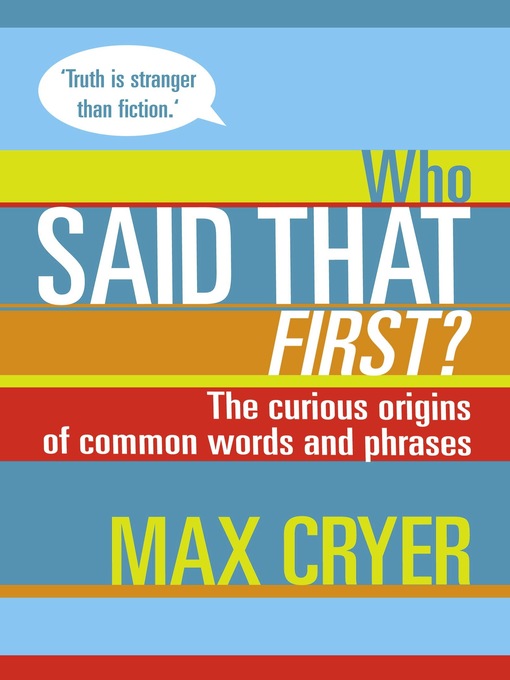Many bright minds have come up with expressions we now take for granted as part of the English language, and which we use freely in vernacular speech. But the originators of many of our most useful second-hand remarks go uncredited. So who said it first? This collection sets out to credit – as far as it's possible to do so – the people who actually created many familiar terms in common us. For example, poor Ernest Dowson is all but forgotten, but author Margaret Mitchell read his 1891 poem 'Non Sum Qualis' and brought one phrase from that poem to the attention of millions. The phrase that caught her eye was 'gone with the wind'. Written in Max Cryer's delightfully witty style, Who Said That First? is a wonderful book to dip into or settle a friendly dispute.
Believe it or not, this is probably the first book to attempt to identify the original sources of some of the English language's most common expressions. We might think we know who first said famous for fifteen minutes, annus horribilis, the cold war and let them eat cake. It's a no brainer, you might say, but Max Cryer has a surprise or two in store for you. I kid you not. In this very readable book, he explores the origins of hundreds of expressions we use and hear every day – and comes up with some surprising findings. Never economical with the truth, he might just have the last laugh.
We learn what they didn't say...We are not amused; Elementary my dear Watson; Let them eat cake; First catch your hare.
We learn that the Bible doesn't mention Salome – or seven veils....
We learn about the origins of the infamous Mile High Club.
Written in Max Cryer's delightfully witty style, Who Said That First? is a wonderful book to dip into or settle a friendly dispute. Remember, good books are few and far between, and you get what you pay for. So buy this book, go ahead, make my day.
Max Cryer is a writer, entertainer and broadcaster, who hosts a weekly radio slot on Radio Live on the quirks of the English language. In a long career, he has been a schoolteacher, a compere and television host, as well as a performer on the opera stage in London and in cabaret in Las Vegas and Hollywood. Now a full-time writer living in Auckland, he has written many books, including Love Me Tender, The Godzone Dictionary and Hear Our Voices, We Entreat.
The inspiration for Who Said That First?
During his years working in Hollywood, Max Cryer became acquainted with Lucille Ball – at the time the world's most popular comedy actress. One day when they were having lunch together, Max complimented her on the amount of pleasure she gave, and Lucille replied: 'I would be absolutely nothing without the writers. It's all to do with the way things are written – they create the springboard for me.'
The remark stayed with Max for years, and he realised it was true. Very often the person who said an effective or memorable line didn't actually create it. As Lucille Ball had said, the person in the background should have the credit – but was usually invisible.
This is was what motivated him to seek not just popular expressions – but who had actually originated them.


دیدگاه کاربران